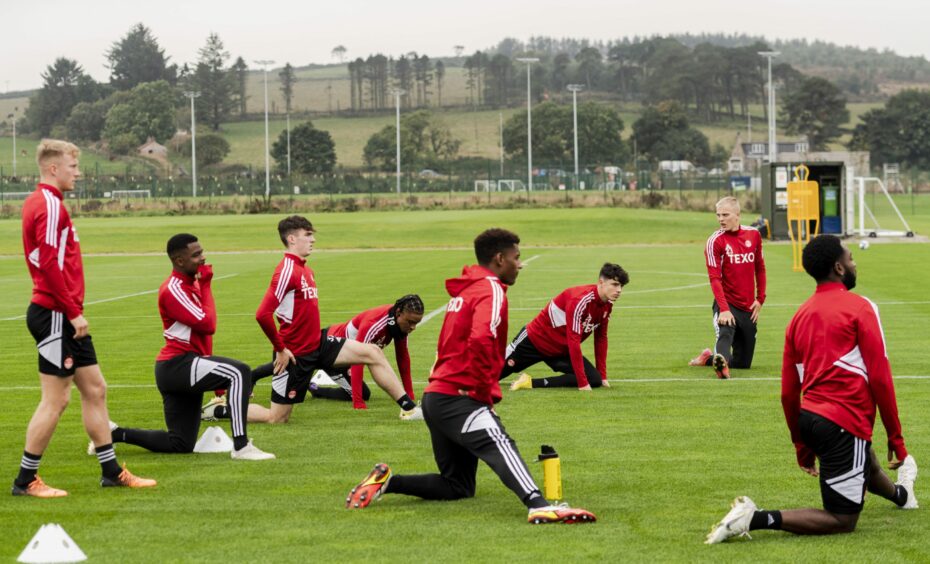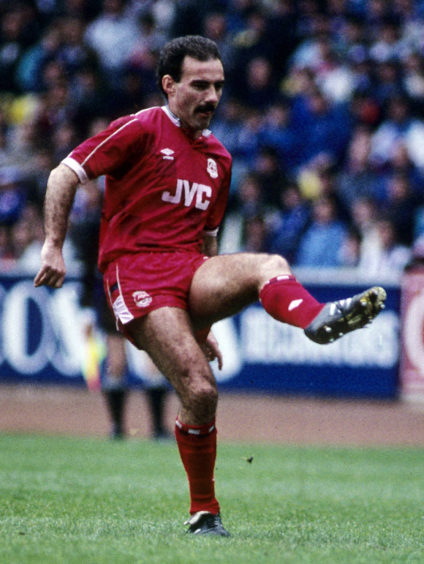I think the SFA’s new rules around heading the football are completely sensible in the battle to limit brain disease cases in footballers.
On Monday, the national governing body announced guidelines which will restrict professional players from heading in training sessions the day before and day after matches.
In addition to this, Scottish clubs have been told to limit repetitive heading to one session per week.
These changes follow similarly sensible rules established for young players in 2020, which saw under-12s banned from heading the ball in training completely.
A 2019 study by Glasgow University laid bare the risks of repeatedly heading the ball -their research showing former footballers were three-and-a-half times more likely to die from brain disease and five times more likely to develop Alzheimer’s.
It is important the SFA – and their counterparts across the world game – take action to try to lower these numbers going forward.
These latest rules governing the adult game have been brought in after 50 men’s and women’s professional clubs in Scotland were consulted about how much heading of the ball their players do in training, with the majority of coaches and players surveyed backing the changes.
Professional players shouldn’t need to head the ball in training all of the time
I applaud the SFA for how seriously they are taking the issue of head trauma, and I’d ask anyone who is not in support of these measures this: How much need is there for modern professional players to practise headers in training?
Yes, there will be occasions where coaches need to work on set-pieces, for example, but not all of the time.
I’d think – with these new restrictions before and after games, and by limiting repetitive heading to one session every seven days – you might be taking away 80% of the instances where some players are heading the ball over a week.
The medical experts clearly believe this could make a big difference to players’ health in later life – and we should listen to them.
In matches, heading the ball remains part of the game.
Although I would say it is less frequent than in previous decades due to changes in style of play and culture.
I think the high punt up the field, with big defenders and big strikers flying in to try to get their heads to it, is not as common an occurrence as teams prefer to build from the back with the ball on the ground. But it does still happen, with free-kicks and corners another element of the game where players are frequently heading the ball.
Because football is a contact sport, clashes of heads are also still something players will suffer now and then.
However, again, by removing most of the headers from training, you are removing the vast majority of overall impacts being taken by the head.
Some people may foresee a future where heading the ball is eventually removed from football completely – including matches – for safety reasons, but I think it would very difficult to implement and it is not something I can realistically see happening any time soon
You never know, with the way things are progressing with the research which is being done, but – if sports like boxing are still able to continue – I’d imagine heading won’t be outlawed completely.
Former pros like me can’t dwell on link between heading and ill health
For players of my generation and earlier, all of the scientific research around heading the ball has come too late, and it is so sad to see what the result has been for some former pros.
When we were playing there was no awareness of the issues heading all the time could potentially cause in later life.
I played with Willie Young in my early days at Aberdeen, before he moved on to – most notably – Arsenal, and Willie was diagnosed with early-onset Alzheimer’s at the age of 68, with repetitive heading pointed to as a contributing factor.
One of my former Dons bosses, Billy McNeill – the iconic captain of Celtic’s Lisbon Lions – was also suffering with dementia when he passed away in 2019.
For the rest of us, the prospect of developing these problems is not something you can dwell on, as you can’t turn the clock back.
All of the headers I went up for in games and training are in the past and, while it would have been brilliant to have had the information about the damage it could have been doing back then, all you can do is try to be as healthy as you can now.
At the end of the day, these neurodegenerative diseases will always be part of the ageing process for some regardless – but anything we can do to minimise the amount of people who suffer these terrible illnesses can only be a good thing.
Fans and inductees always seem to enjoy Hall of Fame get-together
Aberdeen’s annual Hall of Fame dinner last Wednesday was a really good night.
The nostalgic event rightly gives the fans the opportunity to look back on Dons history and the service of selected players – and to thank them for it.
I think the former players who are inducted each year, and their families, always seem to really enjoy it, too, and it strengthens their lasting bond with the Reds.
Of the 2022 inductees, my former 1980s team-mate Dougie Bell travelled up with his two daughters.
Dougie’s wife, Hazel, was from Aberdeen and passed away a few years ago, so he was understandably emotional, but there was humour in his speech, too – as he apologised to those assembled for going to Rangers in 1985!
Duncan Shearer was there with his wife and also spoke really well about what the award and club means to him.
Russell Anderson is now the member of the Hall of Fame who was most recently an Aberdeen player, and he too gave an eloquent speech about his relationship with the Dons.
I was honoured to receive the award belonging to another former team-mate, Frank McDougall, due to the ex-penalty box predator’s current ill health, while Davie Robb – a huge character on and off the park who was at Pittodrie when I arrived in 1971 – sadly couldn’t be with us either after his death last year. However, Davie’s son did a fabulous job of accepting on his behalf.
Dougie Bell, Frank McDougall & Davie Robb were also inducted.
For a round-up of the evening // https://t.co/5Cm6xaofKv pic.twitter.com/ci8DLYWDnz
— Aberdeen FC (@AberdeenFC) November 23, 2022
‘Minnows’ have made waves at Qatar World Cup
So far, the 2022 World Cup has been one which has given smaller nations the stage on which to shine.
When you look at the teams who have turned in lacklustre performances during the first two rounds of group games, high-ranked Belgium, as well as multiple-time winners Argentina and Germany, would be among them – although other big-hitters, like Spain, France and Brazil, have started well.
Belgium, coming into the tournament as the world’s no.2-ranked side, have been particularly poor and left me wondering what’s happened to them.
On the other side, there have been great wins for the perceived minnows in Qatar, and a real feel anyone can beat anyone in some of the groups – Saudi Arabia won 2-1 against the Argentinians, Morocco beat the Belgians 2-0, Japan defeated the Germans 2-1, but then Costa Rica overcame Japan 1-0.
It bodes well for Scotland when we qualify for the 2026 tournament…
On the subject of the next World Cup, I’ve also been impressed by 2026 joint-hosts the USA in their 1-1 draw with Wales and then 0-0 draw with England.
Gregg Berhalter’s Americans are the second-youngest squad at the tournament and their performances so far suggest a bright future, although I think all the underdogs will struggle to beat the likes of the Brazilians, Spanish and the French this time around.




Conversation